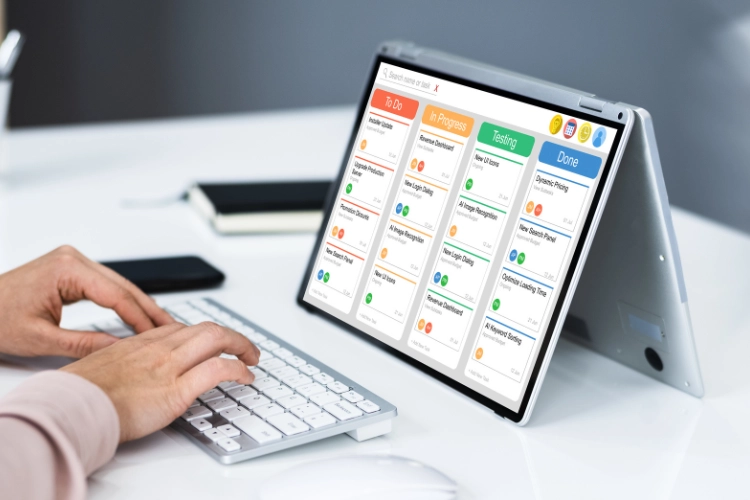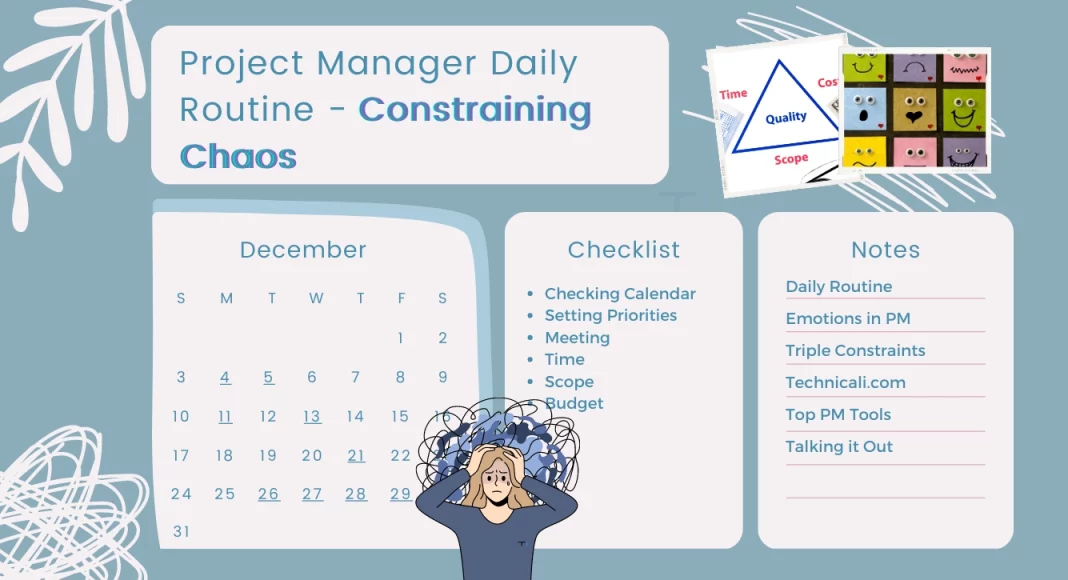You never know what to expect when you start your day as a project manager. One moment, you might be juggling multiple tasks, and the next, you’re dealing with clients’ unexpected budget problems. But that’s just part of the job.
The good news is that these constraints also present an excellent opportunity for the project manager to take the initiative. By being flexible and adaptable, you can ensure that your projects are completed on time and within budget.
It’s easy to say, “don’t let the chaos get you down – it’s all part of the ride!”
Managing project management constraints can be a real challenge.
Bummer? No?
Contents
A day in the life of a project manager

It can be hectic and full of surprises. But, as long as you stay organized and keep up with the constraints of project management, you’ll be able to handle whatever comes your way.
Prepare for meetings and conference calls.

You’ll be the one in charge of keeping everyone on track. Prepare for potential obstacles and do your best to keep things moving along. Prepare an updated Status Report, be available when discussing pressing matters, and eliminate any blocking devices that may slow your team down.
Check-in with team members

You’ll need to check in on your team members’ progress. See how they are doing and what tasks they’ve completed, and review any potential roadblocks that may arise. This is also an excellent opportunity to show them your appreciation for their hard work.
Eating the frogs (stolen from brian tracy)

Just like anything else, there’s no sense in putting off challenging tasks. By tackling your most difficult tasks first, you can rest assured knowing that they’re taken care of. This will free your time to focus on other, more manageable items.
Keeping the momentum of the project

When tasks are completed, don’t let them sit for too long. Keep up with the project’s momentum by distributing tasks as soon as possible to keep everyone working efficiently. It’s not the tricky part; delegating tasks is fun, but you need to keep your eyes open; always assign by keeping the experience level a match; it shouldn’t be too easy or too difficult but challenging enough to have a flow state. You should also consider what other tasks the assignee already has on their plate.
Stay organized and productive.

No matter how chaotic your day gets, staying organized and productive is essential. This means ensuring that all documents are properly stored in an accessible location, managing your team’s resources well, and tracking progress along the way. This can be done using project management tools like Asana, Trello, or JIRA.
How do I maintain a work/life balance and deal with stress?

Work/life balance and stress management are top skills for any project manager to have. When work-related tasks become overwhelming, it’s important to take breaks throughout the day to regain focus and clarity of thought. Taking time off on weekends and evenings also helps me disconnect from work and recharge my batteries.
I also practice yoga regularly, which helps me stay relaxed while helping me maintain a healthy lifestyle. Expressing gratitude daily is another crucial step in managing stress levels, as it allows you to think positively about your successes rather than dwelling on failures or challenges. While gratitude is still a woo-woo zone for many, there have been scientific studies that prove gratitude can positively affect our mental and emotional well-being.
Project managers must understand that chaos and project constraints are not an excuse for failure to deliver. They must be proactive in managing the team, resources, and timeline to stay on track. This means taking the initiative to anticipate potential problems, developing plans of action to address them, and ensuring that tasks are completed on time and within budget.
Using an online planner to keep track of my time

I use a planner to keep track of my day-to-day tasks to stay organized and on top of my projects. This includes creating task lists with deadlines, setting aside time for meetings and calls, tracking project progress with Gantt charts, budgeting for resources and materials, etc.
Having a plan helps me manage my time better and keeps me from becoming overwhelmed. It also allows me to be flexible and adaptable when unexpected tasks arise. With a ClickUp planner, I can break down large projects into smaller tasks that are easier for me to manage in a timely manner.
While there is no one size fits all planner tool, you should check out the Top 7 Project Management Tools and select which benefits you the most.
After the tasks are broken down, I delegate them to my team based on their current work and capabilities. PM tool also helps me monitor their progress and make necessary changes.
Having a systemized process of planning and delegating has helped me to increase team productivity and manage the workload and the quality of our work.
Making an effort to be more communicative (talk it out)

Communication is vital in any project, and as a PM, I must make an effort to be more communicative. Creating an open environment where team members feel comfortable asking questions or providing feedback is essential. This allows me to gain insight into what’s happening within the project and act accordingly.
No matter how much planning or organization you have in place unless you have effective communication between you and your team members, nothing will ever get done successfully. To ensure that everyone appropriately involved communicates and understands every task, I make it a habit of being clear with daily tasks and project plans. I call it ‘Talk it out’ period.
I also make sure to check in with my team leads regularly and to keep them updated about any changes or new tasks. This helps me build better relationships with my team members, as well as trust + understanding of the job at hand. By being communicative, I can update clients and stakeholders on time and ensure everyone is on the same page.
Emotions in Project Management -> The Real Chaos
Project managers are often challenged to lead diverse teams and manage complex tasks, which can easily be influenced by emotions and the resulting chaos. As a project manager, it is essential to know the need to manage emotions to maintain a successful team dynamic and build cooperation. Managing emotions effectively is essential to successful project management as it allows for better communication, collaboration, problem-solving skills, decision-making processes, and team dynamics.
Self-Awareness

The emotional component of project management starts with self-awareness. This means understanding our emotional state and being conscious of how we feel in certain situations or when making decisions. It also involves recognizing how our emotions may affect other people or the situation at hand, allowing us to take steps to prevent any adverse outcomes arising from our emotional responses.
Self-Management

Self-management is critical when it comes to managing emotions in project management. This involves learning to control your reactions and channel your feelings into constructive actions that can contribute positively towards the goal. Doing this effectively requires self-discipline and the ability to objectively analyze situations before taking action. Likewise, developing effective stress management techniques such as deep breathing exercises or regular physical activity can help keep one’s emotions and reactions under control during difficult work times.
Social Awareness

Successful project managers must also have strong social awareness skills to effectively manage their teams’ emotional states. Understanding how different team members respond emotionally in specific contexts will allow you, as a leader, to better direct conversations or activities that are best suited for each individual’s reaction patterns. Learning how to motivate your team through positive reinforcement techniques can create healthy working relationships based on trust rather than fear or competition among members.
Relationship Management

Relationship management is vital when managing team dynamics within a project setting. This involves understanding the strengths and weaknesses of each individual member of the team as well as knowing how best they fit together as a cohesive unit towards achieving common goals. Building solid relationships with all team members will enable more effective communication and faster problem-solving capabilities and provide a stronger sense of loyalty between everyone involved, which increases productivity levels overall.. Learning effective methods for resolving conflicts, such as constructive dialogue or conflict resolution techniques(talking it out), should also be mastered by all project managers so that disagreements don’t lead to further complications down the line due to missed deadlines or unsatisfactory results from an assignment completed by the team.
Team Leadership

Lastly, successful project managers must also have strong team leadership skills. This requires the ability to inspire and motivate individual members of your team while also managing their emotions to foster a sense of cooperation and collaboration amongst all involved parties(even if it’s all Remote or Hybrid). Influential team leaders need to recognize potential sources of conflict early on, as well as develop strategies for resolving any emotional issues that may arise during the course of the project. Successful project managers should be aware that cultural differences can present unique challenges when managing multicultural teams, such as those seen during corporate mergers. The ability to delegate tasks or just give cooling periods to team members when necessary is a must-have skill for all project managers.
Managing emotions within a project setting requires strong personal willpower and considerable interpersonal skills to constrain chaos and create wholesome working relationships among everyone involved. It should be a daily routine for all project managers to assess their team’s emotional state and implement predefined strategies that ensure the success of a project while maintaining healthy working relationships with all members of the group.
How to Manage Chaos with Three Constraints?

Do you think managing scope, budget, and time constraints is easy? Think again! It takes discipline and daily practice to get it right.
Here are some tips on how to manage these three constraints in project management every day:
- Scope Constraints: Make sure you clearly define the project’s scope and what it will entail. This will help to ensure that all stakeholders understand their roles, responsibilities, and expectations from start to finish. Scope Creep is a significant risk to project success, so ensure that the scope is clearly defined and adhered to.
- Budget Constraints: Anchor a budget for the project and try to adhere to it as much as possible. Consider all costs associated with the project and plan ahead for any potential issues or unexpected expenses. Make sure you have enough funds to cover them and, if necessary, consider ways to save on costs without sacrificing the quality of the project.
- Time Constraints: Time is of the essence in project management. Make sure you have realistic timelines for completion, be bold, and renegotiate if needed. Ensure that all deadlines are well communicated and understood by all stakeholders involved. Monitor progress along the way and make adjustments as necessary so that each task comes in on time.
Mark Farrar has written a detailed post on managing triple constraints that’s well worth a read.
Managing the golden triangle in PM is a necessary skill for all project managers to develop if they want to be successful. It requires discipline, planning, and a keen eye for the bigger picture. It can only be accomplished effectively with clear expectations of deadlines established from the start of any project. And I know, With enough practice and dedication, you will soon get the hang of it!
Conclusion
As a Project Manager in today’s ever-changing world, staying organized and focused is essential. Every morning is different for each project manager; some begin with setting the day’s priorities, and some with Zoom meetings. I check my calendar and set priorities straight away. Though when it comes to Emotions in project management, remember small fires may still arise but can be easily managed when you just ‘talk it out.’ while keeping your focus on the triple constraints of time, cost, and scope.
Whatever you do, It is also essential to understand that things don’t always go according to plan, but with practice, dedication, and stepping away from your desk, you will realize:



